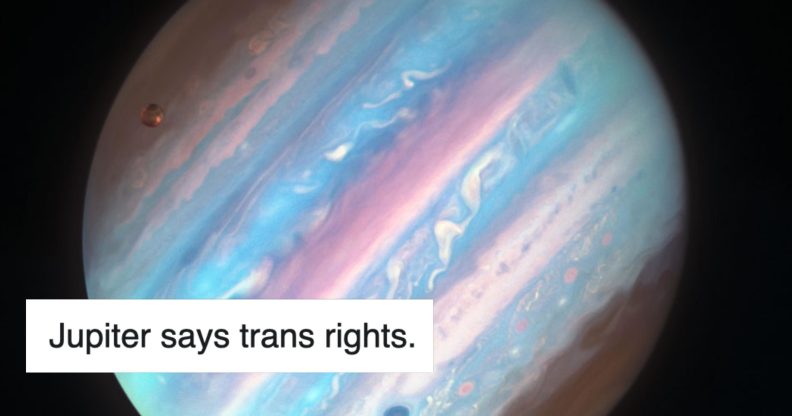Trans solidarity has reached outer space as the Solar System’s largest planet Jupiter says ‘trans rights!’

Jupiter has come out as a trans ally, and, in an official statement, said it needs space from transphobes. (NASA)
What’s that up in the sky? Is it a bird? A plane? It’s Jupiter saying, at the top of its gas-filled lungs, “trans rights!”
The fifth planet from the sun has made the groundbreaking decision to come out in favour of trans rights.
This comes amid Earth’s sluggish and at times spotty support of the trans and gender-diverse communities.
Moreover, Jupiter’s solidarity runs in contrast to anti-LGBT planet Mercury, whose reign of retrograde terror has inflicted harm on all sides of the community for centuries.
https://twitter.com/stellas2ndact/status/1196246009837281280
As the largest planet in the Solar System, it remains unclear whether other celestial objects will follow Jupiter’s interstellar lead.
Trans community welcomes its new 4.505 million-year-old ally.
Jupiter was snapped in UV light by the Hubble Telescope late last year, but has gone viral again in a tweet from a trans activist who tagged a photo of the planet with: “Jupiter says trans rights.”
And LGBT+ Twitter were totally stanning this out of this world activist, creating a storm of support with more than 34,000 likes in under a day.
girls go to college, to get more knowledge
boys go to jupiter,
to bloom into beautiful women
— clunse ‘leona’ bungis (@clunsebungis) November 18, 2019
“NASA confirms that […] 24 of Jupiter’s 79 moons are openly trans,” Nate said.
i petition we use this symbol(it means jupiter) as a symbol trans woman pic.twitter.com/Co3QVs4DKS
— Leah (@lazygott) November 19, 2019
Another user added: “Jupiter is the royal planet. All makes sense.”
https://twitter.com/8FootWarrior/status/1196603874305437696
Jupiter is a trans ally because science.
But why exactly have trans rights reached such astronomical heights?
“Jupiter appears different in near ultraviolet light, partly because the amount of sunlight reflected back is distinct, giving differing cloud heights and latitudes discrepant brightnesses,” NASA’s Astronomy Picture of the Day page stated.
“In the near UV, Jupiter’s poles appear relatively dark, as does its Great Red Spot and a smaller (optically) white oval to the right.
“The String of Pearl storms farther to the right, however, are brightest in near ultraviolet, and so here appear (false-colour) pink.”

